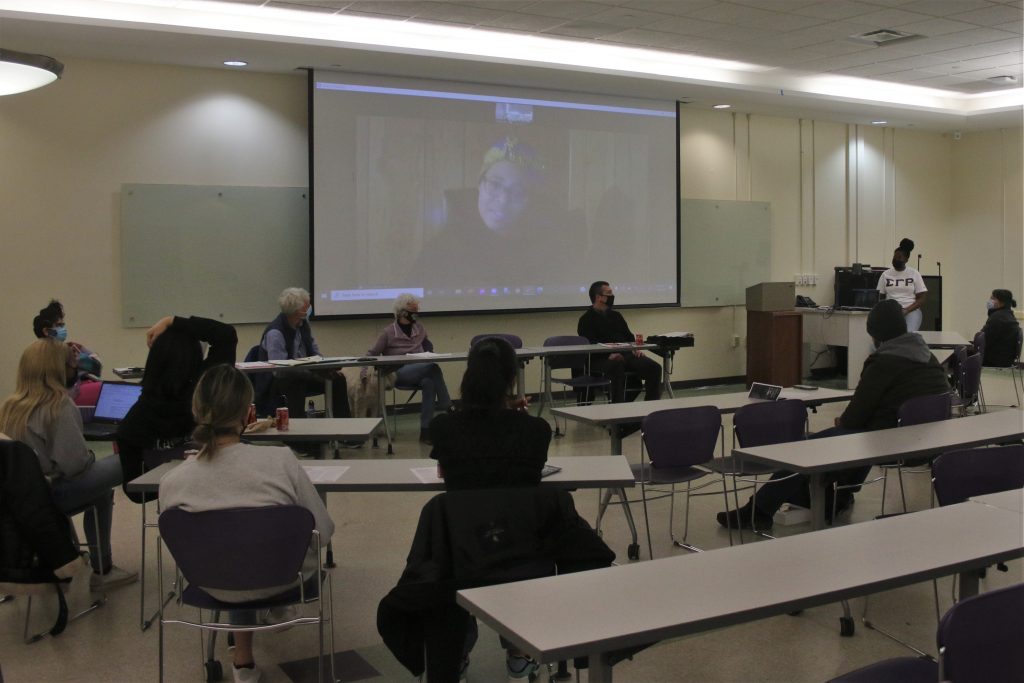Lawyers, professors and a former Binghamton mayor gathered Wednesday to educate students about their rights.
The panel, titled “Know Your Rights,” was hosted by the National Association for the Advancement of Colored People (NAACP), in collaboration with Mary Hu, Student Association (SA) vice president for multicultural affairs (VPMA) and senior majoring in integrative neuroscience. The panel saw a combination of alumni and faculty discuss systemic problems within Binghamton University, strategies for protesting and methods by which reform can occur.
Hu discussed the importance behind hosting the event, which she sought to use to educate students.
“A lot of students in the past few years have organized their own rallies and marches, and definitely a lot more can be done, and they definitely do need to hear more about how they can actually effectively organize and do need to speak up for their rights and advocate for themselves,” Hu said.
A primary topic of discussion for the panel was potential reforms to Binghamton’s New York State University Police Department (UPD). Kanisha Bond, an assistant professor of political science, said UPD’s New York state accreditation can make it easier to advocate for change.
“That’s important because you’ve got a lot more power in requesting — and I am using these words carefully — requesting changes to the statutes that give campus police its sort of breadth of operational discretion,” Bond said. “So where there are concerns about what campus police are doing, you are in a really good position for being able to make direct interventions through sort of whatever institutional channel you choose.”
Tina Chronopoulos, associate professor and the interim chair of Middle Eastern and Ancient Mediterranean studies, said her experiences as a member of the Campus Citizen Review Board (CCRB), which reports possible changes directly to BU President Harvey Stenger, demonstrated that more accountability needs to come from within the UPD.
“The problem that we have is that we don’t have a good record-keeping system, and they will not spend the $10,000 to put that system into place,” Chronopoulos said. “Maybe now that we have made a stink about it, they will. We also told them other things that they could do — easy stuff, meaningless stuff in some ways. You can write an anti-racist statement, put that shit on your website, tell us that you believe Black lives matter. Where is it? I haven’t seen it.”
The panelists also discussed ways groups can organize, protest and engage in civil discourse. Nicholas Scarantino, ‘91, a special counsel for Levene Gouldin & Thompson, LLP and an Off Campus College (OCC) Legal Clinic volunteer, encouraged activists to take an approach of respect when involved in protests.
“Be respectful of other peoples’ rights, and also — you know — listen,” Scarantino said. “Sometimes, you don’t get the chance to express your point of view if you haven’t had a chance to listen to the other side express what they think, and then tell them why they think they’re wrong. Don’t necessarily shout over somebody.”
Scarantino’s point was countered by Dara Silberstein, ‘81, an associate research professor of women, gender and sexuality studies, who said such discussions can leave unrepresented voices unheard.
“You have to have the ability to speak first, in order to invoke the right,” Silberstein said. “It is not that the right is given, it’s not that the speech is given, there is no positive right to free speech. It is the fact that you have speech and the right to protect it, and that dynamic is very problematic when you know the ways in which systematically lots of people’s voices are silenced.”
Victoria Sheung, a programming intern for the VPMA office and a junior double-majoring in Chinese studies and comparative literature, said she appreciated the manner in which the panelists discussed the topics.
“I really appreciate, first, the empathy and the sympathy that professors and faculty and different board members today showed us,” Sheung said. “Because sometimes we feel — as student leaders or members of different cultural groups — I feel like the things that we are doing and the efforts that we are making to pursue something that is just beyond our academic success might be overshadowed by the systems that are not used to us putting our foot out there.”
Bond encouraged students to look for those in higher positions at the University that can set them on a path for reform and advocacy.
“Absolutely, look for your allies,” Bond said. “I mean, you got at least sort of like four or five allies up here now who are in structurally higher positions than you, simply by virtue of being faculty or being alums. We’ve got different sorts of opportunities to engage in different sorts of [conversations]. Know who your allies are, and don’t be afraid to vet them.”



